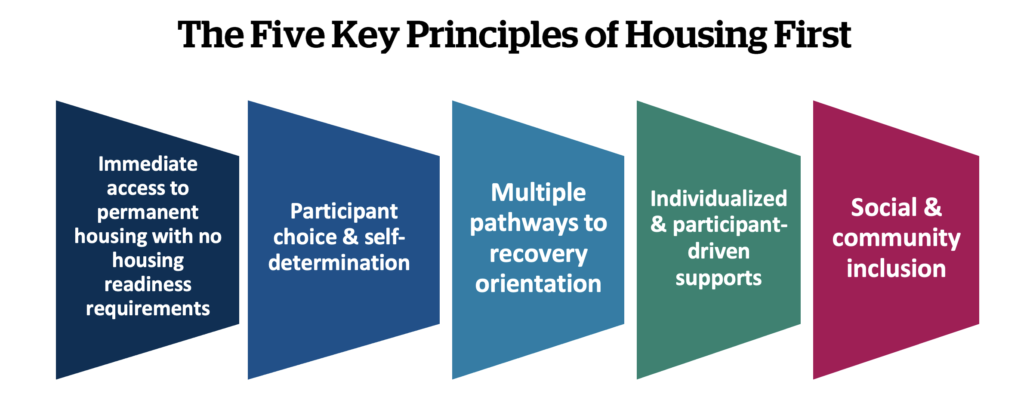Housing First Training Strengthens Community’s Response to Homelessness and Improves Outcomes
Mary Ann Priester
Senior Management Analyst
Mecklenburg County Community Support Services
Housing, Innovation, & Stabilization Services
Andrew Spiers
Director of Training and Technical Assistance
Housing First University
Pathways to Housing PA
The Housing First model is widely recognized as an effective and compassionate approach to addressing homelessness. It is an evidence-based model that has been shown to be successful in helping individuals achieve housing stability, improving their overall well-being, and reducing public costs associated with emergency services and institutional care. By recognizing housing as a fundamental human right and addressing homelessness as a housing issue first, Housing First aims to create a solid foundation for individuals to achieve long-term stability.
In early April, the Mecklenburg County Community Support Services Housing Innovation and Stabilization Services team, in collaboration with the Charlotte-Mecklenburg Continuum of Care, organized a two-day Housing First training led by Pathways to Housing PA. The training brought together over 100 local homeless services providers to develop a deeper understanding of the Housing First model and served as the kickoff event for a 12-week community training from Housing First University.
This blog provides an overview of the Housing First model, the training being provided by Housing First University, and the expected impact for people experiencing homelessness and the greater Charlotte-Mecklenburg community.
WHAT IS HOUSING FIRST?
The Housing First model is based on the belief that housing is a fundamental human right. It recognizes that many individuals experiencing homelessness face complex and interconnected issues. Having a safe and stable place to live is essential for individuals to be able to address other challenges they may be facing. Housing First seeks to break the cycle of homelessness and support individuals in achieving long-term stability and improved quality of life by providing immediate housing and supportive services without any preconditions. It operates on the principle that individuals are more likely to address other challenges in their lives once they have a stable and secure place to live.
Under the Housing First approach, individuals are offered housing as quickly as possible without being required to meet prerequisites like completing treatment programs or demonstrating sobriety. Supportive services, such as case management, mental health counseling, substance use treatment, and employment assistance, are provided alongside housing to help individuals stabilize their lives and work towards self-determined goals.
KEY PRINCIPLES OF HOUSING FIRST
The five key principles of the Housing First include:
- Immediate access to permanent housing with no housing readiness requirements: Housing First recognizes that treatment and recovery are secondary to safety and shelter, and that everyone is “ready” for housing.
- Participant choice & self-determination: Housing is based on client preferences and availability. Participants make their own decisions regarding their housing, supportive services, goals, and path towards stability and recovery.
- Multiple pathways to recovery orientation: Abstinence or treatment is not forced on anyone. Instead, participants are supported in defining what recovery looks like to them.
- Individualized and participant-driven supports: There is no one-size-fits-all approach. Choice is incorporated into all areas of programming—housing, health, mental health, substance use, life skills, etc. This allows participants to access supports on demand, and challenges stigma and systemic barriers to care.
- Social and Community Inclusion: Providers provide opportunities for community integration and social inclusion to reduce participant isolation and improve community cohesion.
HOUSING FIRST UNIVERSITY
Housing First University (HFU) is the training and educational initiative of Pathways to Housing PA, a homeless services agency in Philadelphia. Pathways has been using the Housing First model to help end chronic homelessness since 2008. They started with one clinical team serving 50 participants, and today, house nearly 600 individuals across eight clinical teams in a scattered site setting. Pathways has been able to achieve an 85% housing retention rate after five years with the very participants other agencies deemed “not housing ready”— those with a history of chronic homelessness, psychiatric disabilities, and substance use disorders. As a result, organizations across the country started reaching out to Pathways for guidance. To meet the growing demand for support, Housing First University was launched in early 2020 to help empower other communities to achieve similar successes using high fidelity Housing First practice. Since then time, Pathways has worked with hundreds of agencies through 75+ contracts in 43 states and 12 countries. HFU specializes in helping others to learn and implement best practices for working with individuals experiencing chronic homelessness, serious and persistent mental illness, substance use, traumatic life events, criminal justice involvement, institutionalization, and other disabilities.
HFU’s areas of expertise include the Housing First approach, as well as the components of a high-fidelity Housing First model, Harm Reduction, Integrated Care, and service delivery best practices, including serving diverse populations in a Housing First program. The training staff is made up of clinicians, service providers, and leadership with almost a century of combined experience, who work from a strengths-based and harm reduction focused perspective. A key difference compared to some other training providers, is that the HFU training staff actually do this work – every single day. Trainers combine their direct service experience with best practices in emerging research to provide content that is evidence-based, responsive to current trends in literature, and rooted in practical application. The goal is to invite partner agencies into their circle of expertise to collaboratively build strong programs that best suit their community’s needs.
BENEFITS OF HOUSING FIRST
Housing First prioritizes human dignity and immediate stability, facilitates improved outcomes, and benefits not only people experiencing homelessness but also the local homeless services system, individual service providers, and the broader community.
In helping to align Charlotte-Mecklenburg’s service provision with high fidelity Housing First practice, the community can expect to achieve outcomes similar to what has been achieved by Pathways to Housing PA and in the research conducted with other Housing First programs across the world—
- Increased rates of housing retention and stability
- Increased medication compliance and treatment adherence for physical health conditions, psychiatric disabilities, and substance use disorders
- Decreased hospitalization time, both physical and behavioral health
- Decreased prison system episodes
- Increased rates of participant satisfaction
- Significant cost savings
The Housing First model was developed to serve some of the hardest to reach individuals in our communities— Individuals with histories of chronic homelessness, severe persistent mental illness, and substance use disorders— those for whom the traditional “recovery first” way of housing has not worked. Aligning Charlotte-Mecklenburg service provision with high fidelity Housing First will allow programs to better meet the needs of those who have been traditionally underserved or left behind entirely, including those considered “treatment resistant” or “hard to house.” Housing First emphasizes a person-centered approach to care that allows participants to have more autonomy and choice, resulting in increased treatment adherence, participant satisfaction, and housing retention. This lessens the burden on the homeless services system and improves conditions for the overall community by moving individuals from encampments and public spaces to their own private residences where service providers can better address their needs.
The Housing First model calls for an interdisciplinary team approach to case management, using Assertive Community Treatment or Intensive Case Management teams, which can lessen the burden on individual case managers, decreasing burnout, and improving job satisfaction and employee retention. Admittedly, Housing First work is not for the faint of heart. But those working in Housing First programs, with a true understanding and buy-in for the mission, will be rewarded with incredibly meaningful work and the gift of watching lives change for the better. Seeing an individual through the entire process, from street outreach to housing to employment and even eventual graduation from the program, is a truly incredible thing to bear witness to.
If you are interested in attending the remaining sessions of HFU, please reach out to charmeckcoc@mecknc.gov. All local training materials for Housing First University can be accessed here: Housing First University: Training Materials.
Andrew Spiers, MSS LSW (he/him) holds a Master of Social Service from Bryn Mawr College’s Graduate School of Social Work and Social Research and currently serves as the Director of Training and Technical Assistance at Pathways to Housing PA. Andrew launched Housing First University in January 2020 to provide training, technical assistance, and consulting on the Housing First model, harm reduction, integrated care, and service delivery best practices to help organizations across the country end chronic homelessness in their communities.
Mary Ann Priester has worked with vulnerable and underserved populations, particularly individuals experiencing homelessness for 10+ years. As the Homeless Management Information System (HMIS) Coordinator for the Charlotte-Mecklenburg Continuum of Care, she leads HMIS strategic planning efforts and provides data oversight, technical support, and training to community agencies. She is also the Community Data Lead for the Built for Zero initiative to end homelessness and serves as chair of the NCHMIS Governance Committee.



